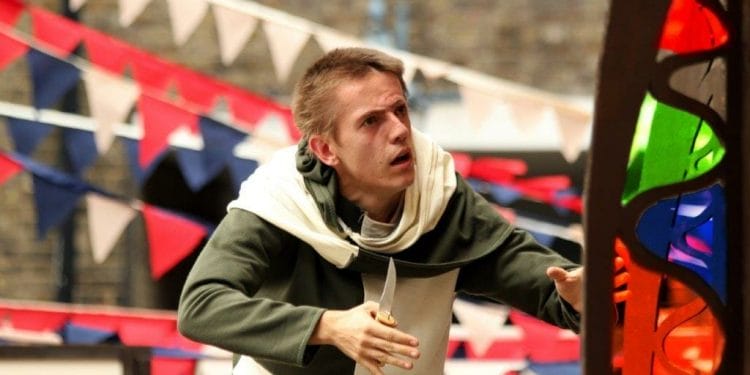 On a fine if breezy summer’s evening, the grounds of St. Paul’s Church in Covent Garden make a perfect setting for this inventive retelling of Victor Hugo’s classic Medieval tale of love, justice and the outsider, The Hunchback of Notre Dame.
On a fine if breezy summer’s evening, the grounds of St. Paul’s Church in Covent Garden make a perfect setting for this inventive retelling of Victor Hugo’s classic Medieval tale of love, justice and the outsider, The Hunchback of Notre Dame.
Benjamin Polya has cleverly adapted the text as a play within a play. As one enters the courtyard and pretty gardens behind the Grade 1 listed church building, bedecked with fluttering tricolour bunting, one is transported to Paris in 1831 and mingling with the Left Bank Players who are about to deliver a spirited promenade performance of the salutary narrative at another time in French history when revolution was in the air.
The cast and crew engage with the audience while marshalling them to move from one performance space to another without breaking the spell of the action. This is no mean feat as, on occasion, it must be rather frustrating to have to wait for people to find new seats before starting a new scene. It’s slightly ironic, too, that given the subject matter of the production, the disabled access during the promenading had not been more thought out. Nevertheless, The Hunchback of Notre Dame is billed as a family-friendly summer show and indeed there are aspects of the audience interaction, such as sponge-throwing and pillorying which will undoubtedly be especially enjoyed by younger (as well as older!) theatre-goers. Look out, too, for the portrayal of Esmerelda’s mystical goat!
Director, Bertie Watkins, makes fine use of the full extent of the courtyard and gardens, with the production ending in triumphant revelation within the dramatically-lit church building itself. The idea to stage the darker, more reflective scenes such as the trial of Esmerelda and Quasimodo’s declaration against the more austere backdrop of the stone courtyard and the lighter moments amid the colourful gardens can surely not have been left to chance.
The six-strong cast are required to show great flexibility as each portrays multiple characters. Katie Tranter, in particular, shows great comic ability as both the hapless jester, Pierre and the air headed aristocrat, Fleur-De-Lys. Darrie Gardner demonstrates an affinity for light and shade with her roles and Ed Bruggemeyer’s powerful presence is made for Frollo. Max Alexander-Taylor is suitably dashing but certainly has the ability to play Phoebus for laughs. In the key roles of Esmerelda and Quasimodo, Izzy Jones and Robert Rhodes are perfectly cast, Rhodes bringing a particularly heart-felt poignancy to his portrayal of the disfigured foundling who rises above his disability to claim justice. The cast also prove to be adept musicians, providing an enthusiastic rendition on Matthew Malone’s authentic sounding compositions.
This innovative production of The Hunchback of Notre Dame has the capacity to be enjoyed on various levels, whether you’re after a bit of slapstick or a social message. Whatever you come hoping for, despite the just audible hubbub from a busy summer Covent Garden outside, you will be transported far from 21st century London.
Book The Hunchback of Notre Dame Tickets























